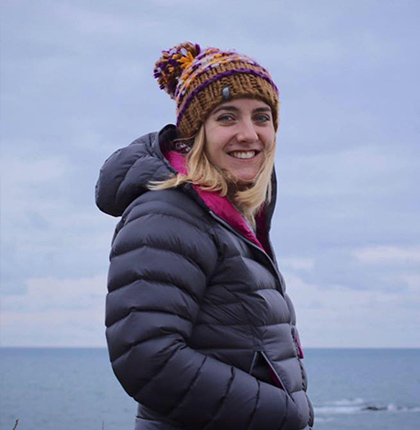Organism and ecological impacts of electrofishing in Scottish shallow coastal habitats
Referred to colloquially in Scotland as ‘spoots’, razor clams are bivalve molluscs belonging to the genus Ensis. They live permanently burrowed deep into the sand of extreme low intertidal and shallow sublittoral habitats, extending siphons up into the water column to suspension feed. Commanding a high price in the Far East, these common shellfish have been increasingly targeted by fishers in Scotland since the mid-1990s. Consequently, the fishery is now valued at approximately £3 million per annum and extracts 400-500 tonnes of razor clams each year.
Electrofishing is the preferred harvesting technique amongst razor clam fishers, producing a cleaner, more valuable product compared with alternative methods. It is also claimed that electrofishing is preferable from an environmental standpoint, however scientific evidence in support of this is limited.
Previously illegal under EU law, the Scottish Government is now trialing electrofishing under tight controls at a number of locations across the country. Marine Scotland is closely monitoring the impacts of the trials on razor clam stocks. Yet, concerns remain that exposure to electrical fishing gear may result in long-lasting impacts on the under-sized razor clams which are not collected, as well as on the wider benthic ecosystem.
My work will address these concerns. To do so, I am performing lab-based experiments, examining the long-term physiological performance of organisms exposed to electrical fields. Alongside this, I am undertaking field sampling to investigate whether there are any detectable adverse effects on benthic communities resulting from experimental electrofishing. Moreover, I am working with Marine Scotland Science’s Assessment team, analysing background data on the trial fisheries.
Ultimately, this work will help to inform the development of a razor clam fishery that is both environmentally and economically sustainable.
Supervisors
Dr Clive Fox, SAMS
Dr Amaya Albalat, University of Stirling
Funder
The Scottish Universities Partnership for Environmental Research, Doctoral Training Partnership (SUPER - DTP)
University
University of the Highlands and Islands
Professional training courses
PADI Enriched Air Diver (MAX 40% O2), Aquasport International, Solihull, 2014
PADI Divemaster, Blue Sea Divers, Mahé, Seychelles,2015
PADI Emergency Oxygen Provider, Aquasport International, Solihull, 2016
HSE SCUBA, University of Plymouth, Devon, 2017
BSAC Snorkel Instructor, Wembury Marine Centre, Devon, 2019
Volunteer Management, The Wildlife Trusts, Devon, 2019
MARINElife Marine Mammal & Seabird Surveyor, Wembury Marine Centre, Devon, 2019
STCW Personal Survival Techniques, Stream Marine Training, Glasgow, 2020
Fieldwork experience
I am an adept scientific diver with experience of:
- Operating under the Scientific and Archaeological ACOP and HSE Diving at Work Regulations 1997.
- Half mask SCUBA.
- Tethered and through-water communications using Aga Divator masks.
- Benthic surveys in both temperate and tropical seas (quadrat, photo quadrat, transect).
I am also acquainted with various boat work sampling techniques, including beam trawls, Van Veen grabs and box cores.
As part of my undergraduate Marine Biology degree, I undertook week-long fieldwork courses in both Roscoff, France and the Ria Formosa, Portugal.
Public engagement experience
As a Marine Awareness Assistant for Devon Wildlife Trust (DWT), I spent my time educating members of the public about Devon's amazing local marine life. This involved:
- Visiting local primary schools to give talks.
- Guiding the public and local school children on ‘rock pool safaris’, and 'snorkel safaris' at Wembury Beach.
- Organising and running my own fundraising event.
- Ensuring the safety of members of the public under DWT's duty of care.
- Maintaining the Centre’s social media accounts and website.
Whilst volunteering as a diver at Plymouth’s National Marine Aquarium, I frequently interacted with the public when performing dive shows and hand feeding resident species
Professional memberships
Marine Biological Association of the UK
Employment
May 2019 – Sep 2019 - MSc Project Placement, Natural England
Jun 2019 – Sep 2019 - Marine Awareness Assistant - Intern, Wembury Marine Centre, Devon Wildlife Trust
Oct 2016 – Sep 2019 - Diver / Dive Supervisor - Volunteer, National Marine Aquarium, Plymouth
Aug 2015 – Sep 2016 - Divemaster, Aquasport International, Solihull
Apr 2015 – Jun 2015 - Trainee Divemaster / Divemaster, Blue Sea Divers, Mahé, Seychelles
Jan 2015 – Apr 2015 - Marine Conservation Intern - Global Vision International (GVI), Seychelles
Higher Education
2020 - present - PhD Researcher, SAMS, University of the Highlands and Islands (UHI)
2020 MSc (Distinction) Marine Conservation, University of Plymouth
2019 BSc (First Class Hons) Marine Biology, University of Plymouth
